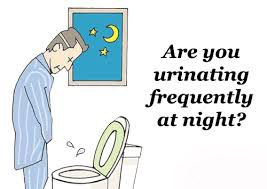Source: Thailand Medical News Oct 23, 2019 5 years, 6 months, 3 days, 14 hours, 26 minutes ago
A recent study conducted in Japan by Tohoku Rosai Hospital in Sendai indicated that frequent trips to the toilet at night to urinate a sign of
high blood pressure.

Although, frequent nighttime urination is also symptom of other underlying medical conditions such chronic kidney failure, congestive heart failure, diabetes and enlarged prostate or even a sign of sleep disorders, in most cases it is actually a telltale sign of
high blood pressure according to the study.
The study was presented at the last 83rd Annual Scientific Meeting of the Japanese Circulation Society (JCS 2019).
Dr Satoshi Konno, of the Division of Hypertension, Tohoku Rosai Hospital and lead author commented in an interview with
Thailand Medical News, “Our study indicates that if you need to urinate in the night, a condition known as called
nocturia, you may have elevated blood pressure and/or excess fluid in your body. If you continue to have nocturia, ask your doctor to check your blood pressure and salt intake.”
Past research from Japan has reported that high salt intake is associated with
nocturia. Compared to western countries, people in Japan and even the rest of East Asia eat more salt and are more likely to be “salt sensitive”, meaning that their blood pressure rises more when salt is consumed. Taken together, these two factors mean that people in Japan and the rest of East Asia are at greater risk of developing
high blood pressure.
This new study examined the link between
nocturia and
hypertension in the general Japanese population. The study enrolled 3,749 residents of Watari who had an annual health check in 2017. Blood pressure was measured and information on
nocturia was obtained by questionnaire. Participants with blood pressure 140/90 mmHg or higher or prescribed antihypertensive drugs were considered hypertensive.
The condition
Nocturia (one or more nocturia events per night) was significantly associated with hypertension after controlling for possible confounders (odds ratio 1.4; p<0.01). The risk of hypertension rose significantly as the number of nocturia events per night inc
reased (p for trend <0.01).
Dr Konno further added, “We found that getting up in the night to urinate was linked to a 40% greater chance of having hypertension. And the more visits to the toilet, the greater the risk of hypertension.”
Of the 1,882 participants who answered the questionnaire, 1,295 (69%) had
nocturia. Dr Konno said the results do not prove a causal relationship between nocturia and hypertension. He said: “The relationship may be influenced by various factors including lifestyle, salt intake, ethnicity, and genetic background.”
Hypertension is a national disease in Japan and also in many East Asian countries including China, Korea, Thailand, Singapore, Vietnam etc. The average salt intake in Japan is approximately 10 g/day, which is more than double the average salt intake worldwide (4 g/day). This excessive salt intake is related to our preference for seafood and soy sauce-based food, so salt restriction is difficult to carry out. Early detection and management of
hypertension are very important to prevent cardiovascular diseases. We should keep in mind that nocturia is not only caused by urinary organ problems but also by systemic diseases such as
hypertension.
More than one billion people have
high blood pressure worldwide.
High blood pressure is the leading global cause of premature death, accounting for almost twelve million deaths in 2018. Medical guidelines recommend medication to reduce the risk of stroke and heart disease. A healthy lifestyle is also advised, including salt restriction, alcohol moderation, healthy eating, regular exercise, weight control, and smoking cessation.
High Blood pressure is also a silent killer as most people are not even aware that they are having
high blood pressure. Frequent medical checkups and routine examinations are critical for all above the age of 35, especially those working in stressful or demanding occupational positions and also those having unhealthy diets.
